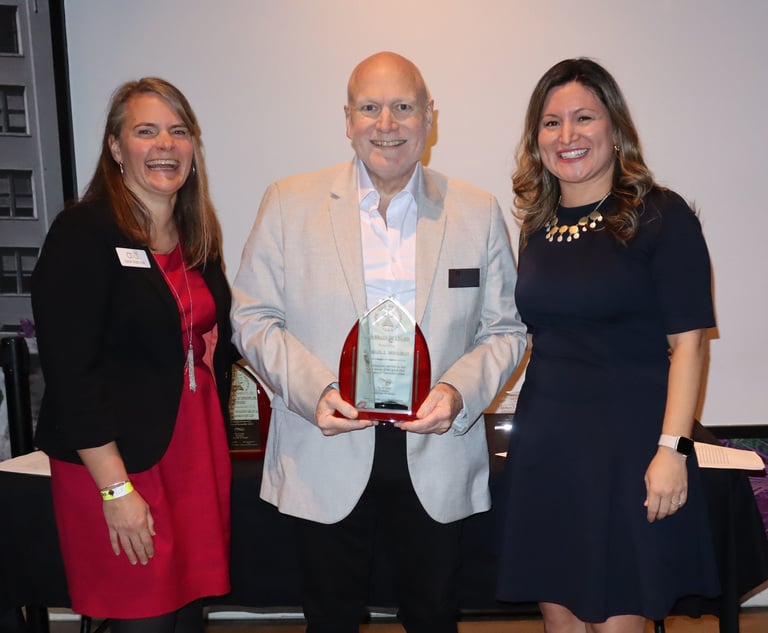Few Legal Endeavors Are As Rewarding as Potentially Saving a Client's Life
One of the first things lawyers learn in domestic violence training at the Atlanta Volunteer Lawyers Foundation is that intimate partner violence can occur in any relationship, regardless of gender, race, religion, sexual orientation, socio-economic status or education level. Two lawyers saw that firsthand.
August 17, 2017 at 01:40 PM
5 minute read
One of the first things you learn in domestic violence training at the Atlanta Volunteer Lawyers Foundation (AVLF) is that intimate partner violence can occur in any relationship, regardless of gender, race, religion, sexual orientation, socio-economic status or education level. We saw that firsthand with a client we recently represented. She was married to her abuser for decades and had several children with him. Both were highly educated, well-employed, and, to the outside world, had presented as a nearly perfect family. Until he tried to kill her.
When we took on her case, they were divorced, but a recent incident had prompted our client to seek a temporary protective order (TPO). AVLF had helped her obtain a 30-day ex parte order for herself, but our job was to extend the protective order for 12 months and also to extend the protection to her children. We had two means to accomplish this: (1) go before the court, present our client's testimony and evidence, and hope that the judge agreed that there was a likelihood that violence would happen again; or (2) negotiate a consent order. Based on everything our client told us about her ex-husband, we were not optimistic about our chances of getting him agree to the TPO.
The morning of the hearing, we met our client at a hole-in-the-wall coffee shop to ensure we did not encounter her ex-husband. We have met with plenty of clients in our careers to prepare for trial, hearings and critical depositions, but we have never felt as much pressure as we did for that morning. We are used to defending large corporations, where the absolute worst that can happen is our clients lose a great deal of money. But we knew our actions that day would affect our client's life and the lives of her children forever. Their very lives could be at stake.
This content has been archived. It is available through our partners, LexisNexis® and Bloomberg Law.
To view this content, please continue to their sites.
Not a Lexis Subscriber?
Subscribe Now
Not a Bloomberg Law Subscriber?
Subscribe Now
NOT FOR REPRINT
© 2025 ALM Global, LLC, All Rights Reserved. Request academic re-use from www.copyright.com. All other uses, submit a request to [email protected]. For more information visit Asset & Logo Licensing.
You Might Like
View All
Lawyers Can Live Worthy of the Calling They Have Received and The Gifts With Which They Have Been Blessed

State Bar of Georgia Presents Access to Justice Pro Bono Awards


Trending Stories
- 1Litigation Leaders: Jason Leckerman of Ballard Spahr on Growing the Department by a Third Via Merger with Lane Powell
- 2Arguing Class Actions: Manifestation Redux
- 3In Free Agent Lateral Era, Big Law Has 'Entire Teams Dedicated to Identifying' Top Talent
- 4Public Notices/Calendars
- 5Monday Newspaper
Who Got The Work
Michael G. Bongiorno, Andrew Scott Dulberg and Elizabeth E. Driscoll from Wilmer Cutler Pickering Hale and Dorr have stepped in to represent Symbotic Inc., an A.I.-enabled technology platform that focuses on increasing supply chain efficiency, and other defendants in a pending shareholder derivative lawsuit. The case, filed Oct. 2 in Massachusetts District Court by the Brown Law Firm on behalf of Stephen Austen, accuses certain officers and directors of misleading investors in regard to Symbotic's potential for margin growth by failing to disclose that the company was not equipped to timely deploy its systems or manage expenses through project delays. The case, assigned to U.S. District Judge Nathaniel M. Gorton, is 1:24-cv-12522, Austen v. Cohen et al.
Who Got The Work
Edmund Polubinski and Marie Killmond of Davis Polk & Wardwell have entered appearances for data platform software development company MongoDB and other defendants in a pending shareholder derivative lawsuit. The action, filed Oct. 7 in New York Southern District Court by the Brown Law Firm, accuses the company's directors and/or officers of falsely expressing confidence in the company’s restructuring of its sales incentive plan and downplaying the severity of decreases in its upfront commitments. The case is 1:24-cv-07594, Roy v. Ittycheria et al.
Who Got The Work
Amy O. Bruchs and Kurt F. Ellison of Michael Best & Friedrich have entered appearances for Epic Systems Corp. in a pending employment discrimination lawsuit. The suit was filed Sept. 7 in Wisconsin Western District Court by Levine Eisberner LLC and Siri & Glimstad on behalf of a project manager who claims that he was wrongfully terminated after applying for a religious exemption to the defendant's COVID-19 vaccine mandate. The case, assigned to U.S. Magistrate Judge Anita Marie Boor, is 3:24-cv-00630, Secker, Nathan v. Epic Systems Corporation.
Who Got The Work
David X. Sullivan, Thomas J. Finn and Gregory A. Hall from McCarter & English have entered appearances for Sunrun Installation Services in a pending civil rights lawsuit. The complaint was filed Sept. 4 in Connecticut District Court by attorney Robert M. Berke on behalf of former employee George Edward Steins, who was arrested and charged with employing an unregistered home improvement salesperson. The complaint alleges that had Sunrun informed the Connecticut Department of Consumer Protection that the plaintiff's employment had ended in 2017 and that he no longer held Sunrun's home improvement contractor license, he would not have been hit with charges, which were dismissed in May 2024. The case, assigned to U.S. District Judge Jeffrey A. Meyer, is 3:24-cv-01423, Steins v. Sunrun, Inc. et al.
Who Got The Work
Greenberg Traurig shareholder Joshua L. Raskin has entered an appearance for boohoo.com UK Ltd. in a pending patent infringement lawsuit. The suit, filed Sept. 3 in Texas Eastern District Court by Rozier Hardt McDonough on behalf of Alto Dynamics, asserts five patents related to an online shopping platform. The case, assigned to U.S. District Judge Rodney Gilstrap, is 2:24-cv-00719, Alto Dynamics, LLC v. boohoo.com UK Limited.
Featured Firms
Law Offices of Gary Martin Hays & Associates, P.C.
(470) 294-1674
Law Offices of Mark E. Salomone
(857) 444-6468
Smith & Hassler
(713) 739-1250






